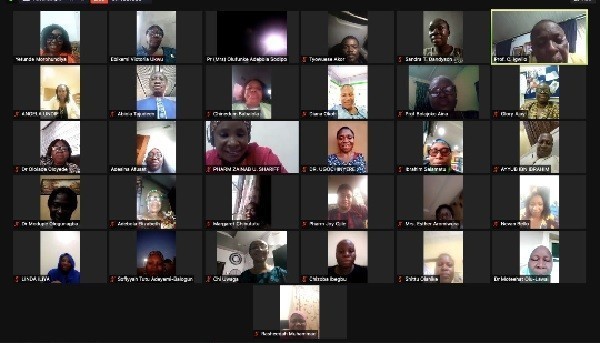
In commemoration of the International Day of the Girl Child, members of the Association of Lady Pharmacists (ALPs) National, joined their voices with that of other women groups across the globe in speaking against all primitive cultures and societal norms that make the girl child second class citizen and vulnerable to all sorts of domestic abuse, which can destroy their destinies. They also called for the robust empowerment of the girl child, especially digitally, which will afford her the opportunity to leverage technology for her development.
The programme, which was organised virtually witnessed a massive turnout of lady pharmacists from across the country, top among whom were, the National ALPs Chairman, Pharm. (Mrs) Victoria Ukwu; Vice-Chancellor, Chrisland University, Abeokuta, Prof. Chinedum Babalola; Distinguished Professor Cecilia Igwilo, chairman of the occasion; Pharm. (Hajia) Zainab U. Shariff, director, Traditional, Complementary and Alternative Medicine, Federal Ministry of Health (FMoH); Chief (Mrs) Yetunde Moroundiya, former ALPs national chairman; Dr (Mrs) Modupe Ologunagba, ALPs national vice-chairman, South-West; Prof. (Mrs ) Olufunke A. Sodipo; Dr (Mrs) Afusat Adesina, ALPs chairman, Lagos State and others.
Speaking on the theme of the 2021 International Day of the Girl Child “Digital Generation: Our Generation”, the keynote speaker Dr Tajudeen Abiola, consultant psychiatrist, Federal Neuro-Psychiatric Hospital, Kaduna, emphasized the importance of building the capacity of the girl child digitally, in order for her to be more productive professionally and economically.

He urged ALPians to always focus on the positive use of digital technology when teaching girls in all their outings, while they should deliberately discourage the girls from engaging in social vices with digital devices, as it has the power to ruin their careers and totally terminate their lives, if they don’t thread with caution.
For the ALPs National Chairman, the marking of the day gives all women ample opportunity to speak against gender inequality, gender based violence, call for empowerment of the girl child, demand for the fundamental human rights of the female gender, seek justice for the molested girl child as well as celebrate those girls that are blazing the trail in their education and career. She explained how the association has been seizing the opportunity annually to mark remarkable impacts in the lives of girls across the country.
“At the end of last year’s celebration of the International Day of the Girl Child, we decided to sponsor secondary education of two girls, one from the northern part of the country and another from the southern part of the country, from JSS 1 to SSS 3. At the end of this year’s event, we are going conclude on our girl child project based on the theme”, she disclosed.
The number one lady pharmacist in the country also commended state chapters’ projects on girl child’s education, as she acknowledged their various outings to schools in mentoring and grooming of girls to become great personalities in the nearest future. Worthy of note was the story of a wayward and poorly behaved girl, who was groomed by one of the members in producing a video for a competition, of which she came out best. At the end of the project, she said the girl got a new knowledge of herself, and changed her behavioral attitude for the better, as she became more accepted by her parents, neighbours and friends.
The Chairman of the occasion. who is also President, West African Postgraduate College of Pharmacists (WAPCP), Distinguished Prof. Igwilo, pointed out the essence of the day, as it was established by the United Nations in 2012 for unearthing and addressing the fundamental challenges facing the girl child. She said it is: “A day to bring to light the struggles of a unique set, a day to amplify our voices against primitive statements that a particular gender is undeserving of certain rights and a day to discuss the benefits of investing on a girl child, recognising her hard work and aiding her to fulfill her potential.
“This day is observed to raise awareness on the implications of gender inequality and eventually create opportunities for every girl across the world. According to UNESCO, about 132 million girls are out of school, with about 15 million not likely to be in the four-walls of a classroom. And apart from access to education, the gender inequality is glaring in other facets of life including legal rights, gender violence, forced marriages and the list goes on…
“It is no news that investing on a girl child has proven to bring dividends to any society that committedly embraces the idea. For instance, educating a girl child can prevent early marriages, decline in child mortality, prevent disease, avert genital mutilation, enhance a stable community, nurture and empower women in the workforce. All of these as we know are critical to breaking the cycle of poverty and boosting economic growth of any nation”, she highlighted.
Prof. Babalola, in her own presentation titled: “Digitalisation: An enhancement to the asset the girl child is”, examined an array of girls and women, who have made names in the field of science and technology, saying digitalization has been a game changer in the education sector, as it has been effectively deployed as a prominent technique in the whole gamut of education. She stated how it has bridged the gap in physical distance as well as embedded more scientific means of impacting knowledge from tutors to students.
She mentioned different initiatives established as interventions against discrimination of girl-child such as the Annual International Girls in ICT Day, launched by the International Telecommunications Union (ITU);Digital Literacy for Women and Girls: Community Centres for Women’s Empowerment in ICT, and so on. These are meant to show the need to create more unfettered access to digital technology for the girl-child, towards changing the narratives in girl-child’s education.
Babalola therefore concluded thus: “Rather than making assumptions about what girls want and need from technology, we must work with them to create solutions to the issues that affect them by enabling them to learn digital skills. Technology can become a powerful tool for girls’ voices to become louder and even reach further”.
On her own part, Hajia Shariff, listed the major challenges facing the girl-child in the society and proffered solutions to them, as she called for the abolishment of any cultural practice that oppresses the girl-child or prevent her from attaining her desired vision in life. Some of the problems of the girl-child she mentioned are: teenage pregnancy/obstetrics fistula, early marriage, domestic abuse, child sex traffic, child labour, rape, illiteracy, poverty among others.
In addressing these issues, she called for proper parenting of the girl-child, educational empowerment, e skill acquisition, entrepreneurship, talent hunt in girls, implementation of Girl Child Right Act 2003 by all states of the federation, as these and others will brighten the future of the girl child.










